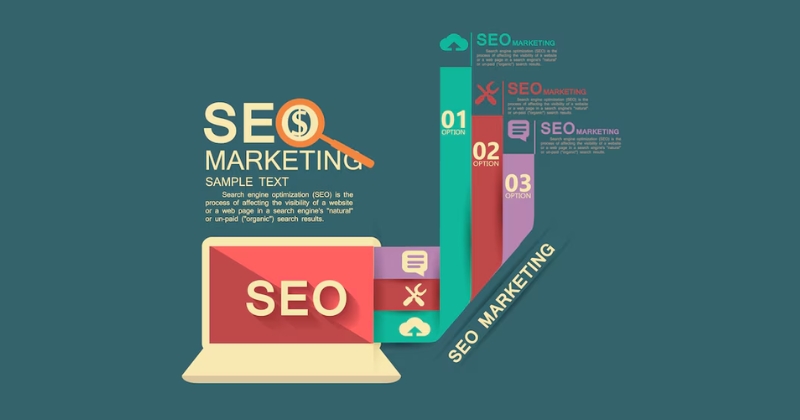In today’s digital world, getting your website noticed online can be a challenge. With millions of websites vying for attention, standing out amidst this crowded digital space requires more than just good content. It requires the right strategies, particularly Search Engine Optimization (SEO). This strategy can make a world of difference when it comes to ranking higher on search engines and ensuring visibility.
So, “what is SEO in digital marketing?” Simply put, SEO is a set of techniques and practices that improve a website’s visibility in search engine results pages (SERPs). It focuses on optimizing various aspects of the website, from its content to its technical structure, to help search engines understand and rank it better.
Curious to know how SEO works and how it can help your website thrive online? This article will dive deep into what SEO is, its benefits, and how it shapes the world of digital marketing. Keep reading to uncover all the details!
Overview of SEO in Digital Marketing
SEO plays a crucial role in digital marketing by ensuring that websites are optimized to rank higher on search engines like Google. The main goal of SEO is to enhance the visibility of a website to increase organic (non-paid) traffic. This is achieved by improving both on-page factors like content quality and off-page factors like backlinks, ensuring that your site meets search engine guidelines.

It is important to note that SEO is not a one-time task but an ongoing process. As search engine algorithms evolve, staying updated with the latest SEO trends is necessary to maintain high rankings. Many businesses rely on best digital marketing services to ensure their websites are continuously optimized, improving their online presence and driving more traffic to their websites.
What is SEO in Digital Marketing?
Search Engine Optimization (SEO) is the process of improving a website’s visibility in search engine results. It involves techniques aimed at ensuring that a website is easily discoverable and ranks high for relevant search queries. The better the SEO strategy, the more likely a website is to be found by potential customers.

1. Keyword Research and Optimization
Keyword research is the foundation of SEO. It involves identifying the terms and phrases that potential customers are searching for. By targeting these keywords, businesses can ensure their content is relevant to users’ needs. Effective keyword optimization ensures that your website content aligns with search engine queries.
2. On-Page SEO
On-page SEO refers to optimizing individual pages on your website. This includes adjusting the content, meta tags, headers, and internal linking to make it more appealing to both users and search engines. Optimized on-page elements help search engines understand the page’s content and relevance to specific keywords.
3. Off-Page SEO
Off-page SEO involves strategies that occur outside the website but still influence its ranking. One of the primary factors is backlink building. Backlinks are links from other authoritative websites pointing to your site, which helps increase its trustworthiness in the eyes of search engines.
4. Technical SEO
Technical SEO focuses on improving the technical aspects of a website to enhance its performance. This includes optimizing website speed, ensuring mobile-friendliness, and making the site easier for search engines to crawl and index. A well-structured website provides a better user experience and increases chances of ranking higher.
5. Content Quality
Content quality plays a vital role in SEO success. Search engines prioritize websites that provide valuable, relevant, and well-structured content. High-quality content engages users, increases the time spent on the site, and can lead to higher rankings as a result of user interaction and social sharing.
6. User Experience (UX) and SEO
User experience (UX) directly affects SEO rankings. A well-designed, intuitive website that is easy to navigate keeps users engaged. Elements like a fast-loading website, mobile responsiveness, and clear navigation are essential for providing a good UX, which in turn can boost your rankings.
Endnote: Understanding SEO in digital marketing is essential for driving traffic and ensuring visibility in an ever-competitive online landscape. Whether through on-page, off-page, or technical tactics, every element plays a role in improving a website’s performance.
Benefits of SEO in Digital Marketing
SEO offers a wide range of benefits that make it an essential component of any digital marketing strategy. It is not just about driving traffic; it’s about attracting the right kind of traffic. Here’s why businesses should invest in SEO.
SEO is one of the most cost-effective digital marketing strategies. By improving organic search results, businesses can reach a wider audience, build credibility, and increase their chances of converting visitors into customers.
- Increased Website Traffic: SEO directly impacts the number of visitors a website receives. Optimizing a site for relevant keywords increases its visibility in search engine results, leading to higher click-through rates and more organic traffic.
- Higher Conversion Rates: Websites that rank higher for relevant keywords tend to attract users who are actively searching for products or services. This targeted traffic is more likely to convert into sales or leads, improving the return on investment (ROI).
- Improved Brand Credibility: Ranking high on search engine results pages helps build trust and credibility with users. A website that appears on the first page of search results is more likely to be perceived as a trusted authority in its field.
- Better User Experience: SEO practices like improving website speed, mobile responsiveness, and navigation contribute to a better overall user experience. A seamless experience encourages visitors to stay longer and explore more pages, reducing bounce rates.
- Cost-Effective Marketing: Unlike paid advertising, SEO focuses on organic methods to increase visibility. Though SEO requires an upfront investment of time and resources, the long-term benefits, such as sustained organic traffic, make it a more cost-effective option than paid campaigns.
- Long-Term Results: While it can take time to see results from SEO efforts, once a website achieves high rankings, it can maintain them for an extended period. This long-term benefit makes SEO a great strategy for sustained growth and visibility.
SEO provides both immediate and lasting benefits for businesses. By driving targeted traffic, increasing conversion rates, and improving brand credibility, it ensures that digital marketing efforts are cost-effective and result-oriented.
Conclusion
In conclusion, “what is SEO in digital marketing?” It’s a set of practices aimed at optimizing your website for higher visibility in search engine results. Through strategies like keyword research, on-page optimization, and backlink building, SEO enhances a website’s performance and attracts targeted traffic. The importance of SEO cannot be overstated, as it helps businesses gain credibility, increase conversions, and maintain long-term success online.
If you want to improve your digital marketing efforts, consider implementing SEO strategies into your business plan. Remember, SEO is not a one-time task—it’s an ongoing process that requires continuous attention and optimization. Best of luck with your SEO journey, and may your website continue to grow and thrive!



